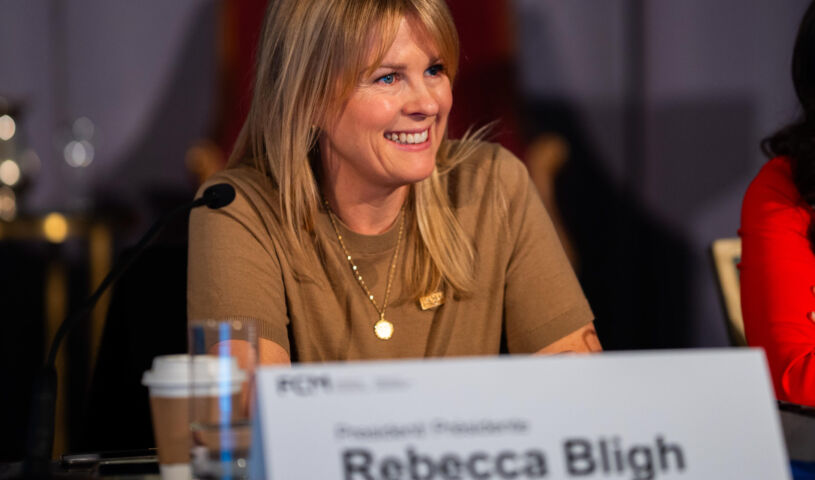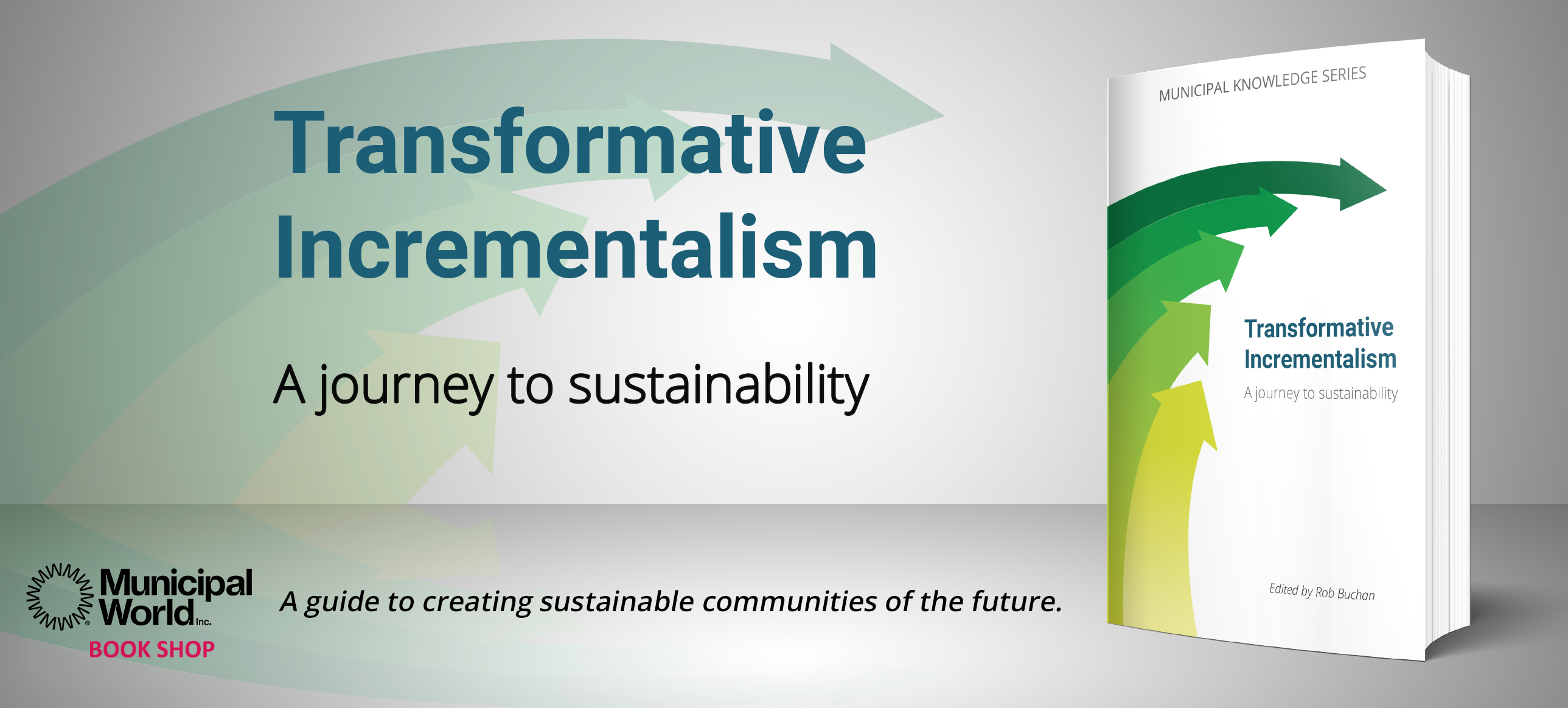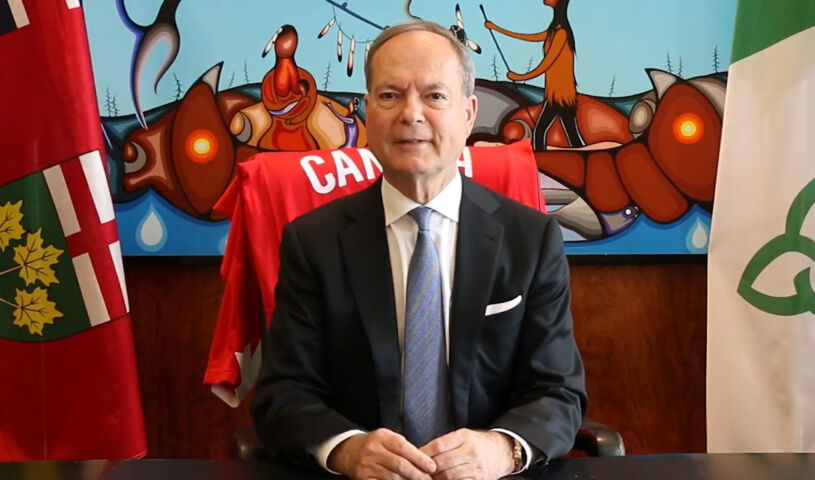As FCM prepares for its national event, it also looks to the future
 Having this year’s annual gathering of municipal leaders in Ottawa, according to FCM President Rebecca Bligh, is “serendipitous” given the time that Canadians find themselves in. Photo: Federation of Canadian Municipalities
Having this year’s annual gathering of municipal leaders in Ottawa, according to FCM President Rebecca Bligh, is “serendipitous” given the time that Canadians find themselves in. Photo: Federation of Canadian Municipalities
Rebecca Bligh was appointed as president of the Federation of Canadian Municipalities (FCM) back in October 2024. By the end of this week’s FCM conference in Ottawa, she will officially have the role.
Bligh, a City of Vancouver councillor, took on the president’s role after former Colchester County, N.S., deputy mayor Geoff Stewart lost in his own mayoral bid. Since that time, Bligh has been busy navigating what she describes as “a dynamic entry” into the role as president. After all, Bligh has had to deal with the political return of U.S. President Donald Trump and the global trade war he launched that has affected both Canada’s economy and its sovereignty.
Trump’s actions were followed by a federal leadership race by the governing Liberal Party. After that, a federal election that was won by the party’s new leader, Mark Carney.
“I cannot believe that I have not yet officially taken the helm as president, but I’d say that that runup has prepared me for what I feel like could be anything that might happen in the next year and a half,” Bligh said. “It has been a very interesting and incredible learning experience as I prepare to take over as president officially.”
FCM 2025: Stronger, Together
The theme for this year’s conference is “Stronger, Together: Local Strength, National Prosperity.” While the theme might be a bit of a mouthful, Bligh said it speaks to the importance of the national gathering.
Bligh said the conference draws an average of 3,000 delegates and this year’s event in Ottawa is expected to be no different. As always, the conference will feature networking opportunities for municipal leaders from rural, northern, and urban communities; workshops and study tours; the annual trade show; and participation from various federal officials, too.
Having this year’s conference in Ottawa, Bligh said, is “serendipitous” given the time that Canadians find themselves in.
“This is about winning the moment that’s before us and we are in a critical moment in our country’s history where all orders of government must work together to tackle some of our biggest challenges,” she said. “Municipalities are really at the epicenter of those challenges, right across the country. So ‘Stronger, Together: Local Strength, National Prosperity’ is really about putting a focus on the kind of work we want to be doing to drive results for Canadians.”
Embracing the Conference Lifestyle
Bligh was first elected to Vancouver council in 2018. She was re-elected in 2022. Over that time, Bligh has engaged with many municipal leaders at the FCM conference. With that perspective, Bligh recognizes why members look forward to the convention each year.
The conference, she said, provides delegates with a chance to step away from their daily roles and connect with one another. Time and again, she has heard how valuable it is for FCM members to learn from one another, share experiences, and even form lasting friendships.
The conference features dynamic workshops, inspiring keynotes, and insightful study tours, all designed to provide valuable experiences. Bligh said the insights, tools, and diverse perspectives gained are essential for delegates to bring back to their communities.
“It’s a very exciting time for our members. You sort of bring them all into this massive conference centre and it’s just amazing how many just organic and natural relationships form,” Bligh said. “From there we all go home to our communities. We can then really build on those connections in how we can continue to engage with one another and get ready for another year’s worth of work.”
Time for Presidential Responsibilities
Bligh hasn’t yet experienced the conference with her presidential hat on, but she has certainly enjoyed it as a councillor.
The conference is an opportunity for professional development, Bligh said. That isn’t necessarily something that is a prerequisite for taking on the job of a city councillor or a mayor. But even so, Bligh said it’s important to be able to access those learning opportunities whenever possible.
This year’s conference will be different, as Bligh comes in with presidential responsibilities she never had before. It’s a change that Bligh acknowledges she has given a good deal of thought.
“It’s critically important to me that I continue to develop my ability to take off my municipal hat and put on that presidential hat for FCM,” Bligh said. I have to make sure that I’m thinking big picture to best serve all our members.”
Municipal Priorities for 2025
With the new Liberal government having been sworn in, Bligh said the focus has to shift into how FCM can best work with its federal counterparts to drive forward important municipal change.
Bligh said FCM’s focus remains on advancing advocacy priorities that municipal leaders have consistently emphasized – including issues such as housing affordability and availability, homelessness, economic strength, and public safety. There are also emerging conversations around breaking down interprovincial trade barriers and improving business collaboration.
All that said, Bligh is quick to point out that the outdated fiscal tools municipalities have are limiting the results that can be achieved. This, she said, needs to be addressed.
Municipalities, Bligh said, need smarter, more collaborative fiscal models to fund critical infrastructure and drive housing development. The National Prosperity Partnership is FCM’s key proposal to push these discussions forward. This, she added, is especially true with a new prime minister and minister of housing and infrastructure in place.
Now is the ideal time to advance these efforts, ensuring municipalities remain central to shaping Canada’s economic future.
“Municipalities are the economic engine of our country. We’re enablers for many of the priorities that the federal government has outlined as part of their platform coming into this new administration,” Bligh said. “Municipalities can be great partners to make sure that that happens in a seamless way.”
National Problem, Local Perspectives
Canada’s new Minister of Housing and Infrastructure, Gregor Robertson, has sparked controversy due to his past tenure as Vancouver’s mayor from 2008 to 2018. Critics argue that during his time in office, housing affordability worsened significantly, with real estate prices more than doubling in Vancouver.
Some former colleagues and housing advocates worry that his approach to housing policy may not address Canada’s current affordability crisis. Bligh sees things differently. She said she sees “some real synergy” in Robertson having been a mayor, and a mayor of Vancouver, no less.
Vancouver has been described as ground zero for not only the housing crisis but also the struggles municipalities face around homelessness, public health, mental health, mental health, addiction, and public safety. As such, Bligh said, nobody knows better than local leaders the challenges involved in solving those problems.
This is why she sees it as “tremendously important” that local government voices need to be at that table to make sure they are balancing both historical experience and knowledge of what’s emerging. The housing crisis, she added, is just one example.
“New housing is down considerably given the escalating costs associated with interest rates, with just the cost of construction itself, materials, as well as a moving environment geopolitically with the U.S. and the trade wars,” Bligh said. “That’s happened overnight. We didn’t forecast that. So, we have to be able to respond in real time when the landscape shifts in such a dramatic way. We need those [local government] voices at the table to do that.” MW
✯ Municipal World Executive and Essentials Plus Members: You might also be interested in Stephen Scott’s article: Building a proactive municipal decarbonization strategy.
Sean Meyer is digital content editor for Municipal World.
Related resource materials:



